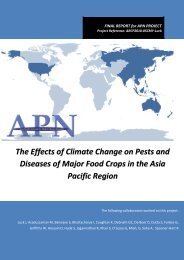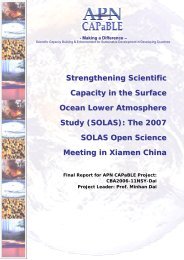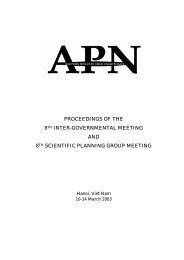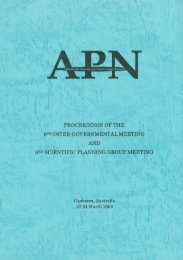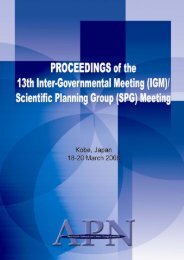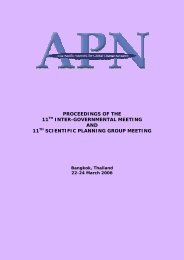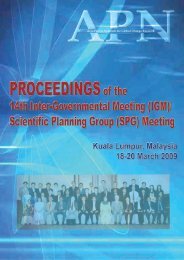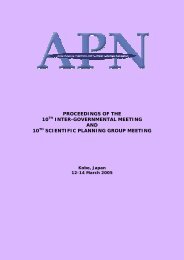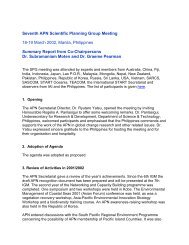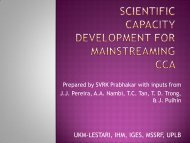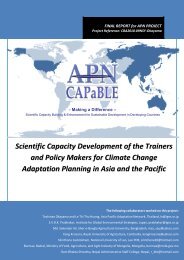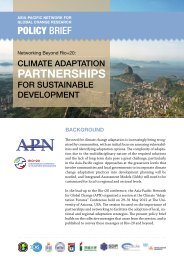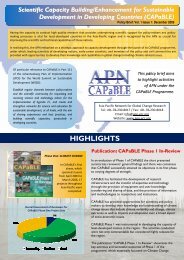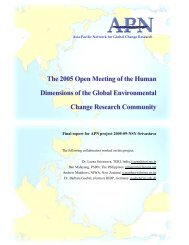APN Newsletter - Asia-Pacific Network for Global Change Research
APN Newsletter - Asia-Pacific Network for Global Change Research
APN Newsletter - Asia-Pacific Network for Global Change Research
Create successful ePaper yourself
Turn your PDF publications into a flip-book with our unique Google optimized e-Paper software.
Enhancing Adaptation to Climate <strong>Change</strong> by<br />
Integrating Climate Risk into Long-Term Development<br />
Plans and Disaster Management<br />
Reference No.: ARCP2010-09NSY-Patankar<br />
Project Leader: Dr. Archana M Patankar, K. J. Somaiya Institute of Management Studies and <strong>Research</strong><br />
http://www.apn-gcr.org/resources/items/show/1572<br />
Extreme weather events<br />
affect vulnerable urban<br />
areas adversely; with substantial<br />
damages, disruption of normal<br />
economic and social activities<br />
and loss of human life, and<br />
have the potential to alter the<br />
medium- to long-term development<br />
trajectory of these areas.<br />
Thus, disaster management is an<br />
important context <strong>for</strong> integrating<br />
adaptation into decision-making<br />
in urban areas. With this in view,<br />
the <strong>APN</strong>-funded research project<br />
titled “Enhancing adaptation to<br />
climate change by integrating<br />
climate risk into long-term development<br />
plans and disaster management”<br />
was undertaken in the<br />
<strong>Asia</strong>n cities of Mumbai (India),<br />
Bangkok (Thailand) and Manila<br />
(Philippines). This project primarily<br />
aimed at identifying and measuring<br />
the short- to medium-term<br />
impacts of, and responses to,<br />
extreme weather events and their<br />
policy implications <strong>for</strong> long-term<br />
adaptation capacity and development<br />
planning of the cities.<br />
The selected cities are located<br />
in densely populated low-lying<br />
coastal areas described by the<br />
IPCC Fourth Assessment Report as<br />
“key societal hotspots of coastal<br />
vulnerability”. With millions of<br />
people residing in these cities, the<br />
risk to life and property remains<br />
high as the cities are vulnerable to<br />
extreme weather events that lead<br />
to flash floods. Many instances<br />
of severe flooding due to highintensity<br />
precipitation have been<br />
recorded in these cities in recent<br />
years, including the unprecedented<br />
floods in Bangkok in 2011.<br />
This research project analysed the<br />
near- to medium-term post-disaster<br />
recovery scenarios in the aftermath<br />
of extreme floods faced by<br />
the three cities, namely, the July<br />
2005 floods in Mumbai, floods in<br />
four eastern districts of Bangkok<br />
in 2006 and extreme floods<br />
brought on by tropical storms of<br />
Ondoy and Pepeng in Manila in<br />
2009.<br />
The project developed three case<br />
studies <strong>for</strong> the selected cities.<br />
Each of the studies measured the<br />
physical, economic and social<br />
impacts of extreme floods, identified<br />
the public and private<br />
responses in the short- to<br />
medium-term and explored their<br />
policy implications <strong>for</strong> long-term<br />
adaptation capacity, city resilience,<br />
as well as investment and<br />
development plans. Each study is<br />
based on the analysis of primary<br />
and secondary data pertaining to<br />
the selected events of flooding<br />
and their resultant physical,<br />
economic and social impacts. The<br />
impacts considered include loss of<br />
life, injuries, damage to property<br />
and infrastructure; damage to<br />
economic stocks like physical<br />
capital and inventory; indirect<br />
impacts on flow variables like<br />
income; investment and employment;<br />
and disruption of essential<br />
services. After measuring these<br />
impacts, the analysis focused on<br />
the immediate- to medium-term<br />
post-recovery scenario, wherein,<br />
we examined the responses of<br />
the civic administration as well as<br />
citizens themselves to cope with<br />
future floods. The findings of the<br />
project were further discussed<br />
in the stakeholder workshop to<br />
explore how they can lead to<br />
better understanding of future<br />
adaptation needs that would<br />
lead to long term reduction in<br />
ARCP-Funded Projects •<br />
27<br />
ARCP-Funded Projects



